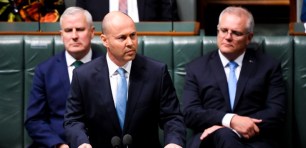
A peak accounting body says the federal government could consider passing legislation that would allow small businesses to deduct the cost of applying for tax-free COVID-19 grants against other business income.
The Australian Taxation Office (ATO) has recently updated its guidance about deductions for expenses involved in applying for tax-free government support payments, stating that businesses will not be able to claim deductions on the cost of using an accountant to apply for grants on their behalf or determine their eligibility.
Elinor Kasapidis, senior manager tax policy at CPA Australia, says many businesses are “doing it tough due to lockdowns” yet they must bear the full financial burden of seeking accounting advice to access financial support.
“Arguably, it’d be appropriate for Parliament to legislate to allow them to deduct this expense against other business income,” Kasapidis tells SmartCompany.
However it is unlikely such legislation will be passed because it is a fundamental rule of the taxation system that you cannot deduct expenses from tax-free income.
“The ATO doesn’t actually have any wriggle room to let businesses deduct the cost of accounting services against business support grants,” Kasapidis says.
The updated guidance follows new legislation, passed earlier this month, that makes COVID-19 support payments for businesses tax free.
The ATO encourages small businesses to keep accurate records of fees paid to accountants or bookkeepers because they may be made up of a mixture of non-deductible and deductible expenses.
Kasapidis says accountants’ invoices, letters of engagement or contracts usually describe the type of services provided.
“A tax agent can assist businesses determine what is fair and reasonable, as well as whether the expense is incidental,” she says.
ATO to claw back cashflow boost payments
The ATO has also indicated it is tightening its compliance measures around the federal government’s cashflow boost payments.
Along with JobKeeper, the cashflow boost payment was one of the most significant government support programs rolled out during the first year of the pandemic.
But unlike JobKeeper, businesses did not need to suffer a decline in turnover to qualify for the payments of up to $100,000 if the business’ turnover was below $50 million.
The ATO has begun contacting cashflow boost recipients if it notices unusual changes in the amount of wages the business paid out or evidence of withholding amounts to potentially receive support payments despite not being eligible.
While business that self-correct their activity statements will not receive penalties, the ATO has confirmed that it will require business to pay back any overpaid cashflow boost payments.
Kasapidis says ATO now has another 12 months of information about recipients of the cashflow boost payments and is in a better position to see where the program was misused.
“Given the speed and scale of the program, as well as the fact that payments were made automatically, the ATO has a responsibility to chase up incorrect payments,” she says.
Handpicked for you

Review calls for the Small Business Ombudsman’s name to change to “reduce confusion”



COMMENTS
SmartCompany is committed to hosting lively discussions. Help us keep the conversation useful, interesting and welcoming. We aim to publish comments quickly in the interest of promoting robust conversation, but we’re a small team and we deploy filters to protect against legal risk. Occasionally your comment may be held up while it is being reviewed, but we’re working as fast as we can to keep the conversation rolling.
The SmartCompany comment section is members-only content. Please subscribe to leave a comment.
The SmartCompany comment section is members-only content. Please login to leave a comment.